Mapping to Focus Areas
Below, you find the module's mapping to the study program's focus areas. This is done as a contribution to all relevant focus areas (in ECTS, and content-wise). This is also relevant for setting the module in relation to other modules, and tells to what extent the module might be part of other study programs.
| Focus Area |
ECTS (prop.) |
Module Contribution to Focus Area |
| Generating and Accessing Knowledge |
4 |
The course introduces the basic concepts of Linked Open Data (LOD) as well as the construction of knowledge graphs.
|
| Acting Responsibly |
1 |
The course introduces the basic concepts of Linked Open Data (LOD) as well as the construction of knowledge graphs.
|
| Designing Innovations and Products |
1 |
The course introduces the basic concepts of Linked Open Data (LOD) as well as the construction of knowledge graphs.
|
Learning Outcome
The course aims to equip students with the knowledge and skills needed
to leverage Linked Open Data (LOD) and Knowledge Graphs effectively in
various professional contexts. Through active participation,
discussions, and a hands-on project, students will gain a deep
understanding of how LOD and knowledge graphs are transforming the way
data is managed and knowledge is represented in the digital age. We
will explore real world applications like
Wikidata and Open Research Knowledge Graph
(ORKG).
After finishing this course students are able to use, extend and
construct knowledge graphs.
Module Content
- Linked Open Data
- Knowledge Graphs
- Semantic Searches
- RDF
- SPARQL
- Applications - Wikidata and ORKG
The course adopts an interactive seminaristic style, fostering active
engagement and collaborative learning among participants. In addition
to comprehensive lectures, the seminar incorporates paper discussions,
enabling students to critically analyze and debate research papers and
case studies related to Linked Open Data and Knowledge
Graphs. Furthermore, students will have the opportunity to showcase
their understanding through presentations, where they can articulate
their insights and findings on relevant topics. To reinforce practical
application, the seminar culminates in a programming project, where
participants will design, implement, and evaluate a real-world project
that involves the construction and querying of a knowledge graph,
applying the principles learned throughout the seminar. This
multifaceted approach ensures that students not only acquire
theoretical knowledge but also gain hands-on experience and the
ability to apply these concepts in practical scenarios.
Learning Material Provided by Lecturer
- lecture slides and videos
- exercises
Literature
-
Hitzler, Pascal. “A review of the semantic web field.”
Communications of the ACM 64.2 (2021):
76-83. https://doi.org/10.1145/3397512
-
“Knowledge Graphs – Methodology, Tools and Selected Use
Cases”, Fensel, D.,
Şimşek, U., Angele, K., Huaman, E., Kärle, E., Panasiuk, O., Toma,
I., Umbrich, J., Wahler, A., 2020, ISBN 978-3-030-37439-6
